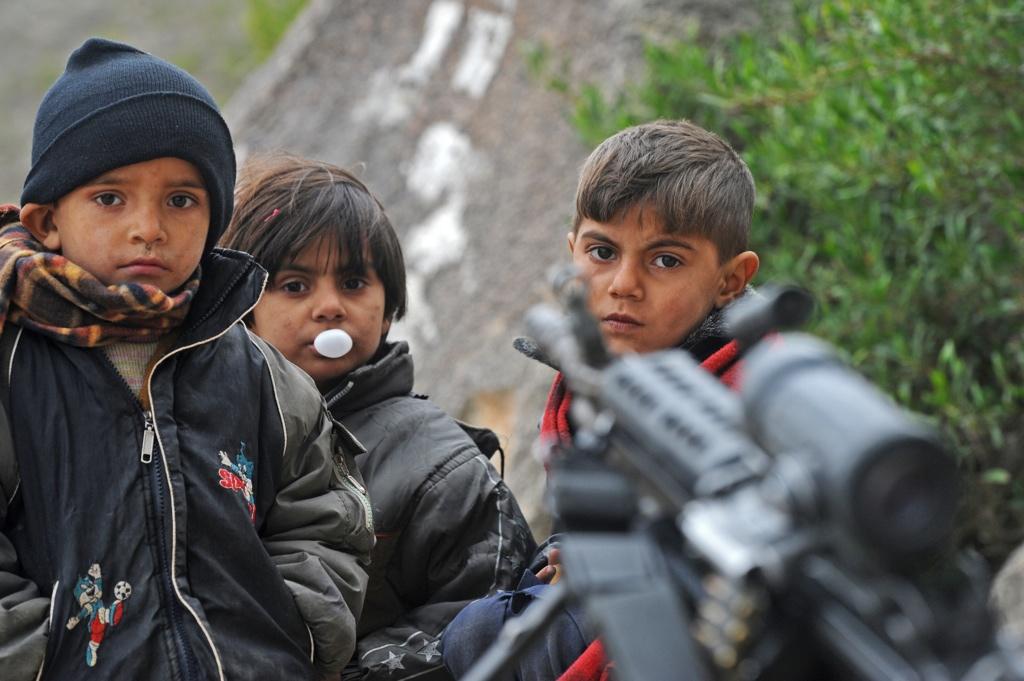War means never having to say you’re sorry
Afghan children look on at unseen U.S. soldiers on patrol in Kunar on Dec. 10, 2009.
By any measure, it was a horrible tragedy. Nine young boys, out gathering firewood for their families in the hills above their homes in Kunar province, were targeted by U.S. helicopter gunships, bombed, strafed, and killed.
The American soldiers erroneously thought the boys were insurgents responsible for an attack on their base nearby. The response was more or less predictable: regrets from the commander for U.S. and NATO forces, General David Petraeus, who promised an investigation. Outrage and grief from the families of the slain, and a gathering storm of protest in Kabul and elsewhere.
President Hamid Karzai, in a break with diplomatic protocol, rejected an in-person apology from Petraeus, and said that the Afghans were “tired of incidents and excuses.” This, according to my Afghan friends, is a pretty big deal, amounting to a public slap in the face for the U.S. commander.
“Even if your enemy comes to you and apologizes, you forgive him,” said one. But this time the Afghans are having none of it. The death of the boys comes on the heels of another report from Kunar that up to 67 civilians were killed in an airstrike in a remote area of the province. An Afghan government delegation has confirmed the accounts, but NATO insists that all of the dead were insurgents.
There will be no apologies for that one. This is all painfully familiar to those of us who have been in Afghanistan for several years. The costs of this war, in blood and treasure, are mounting, and many are beginning to wonder if the possible rewards are worth it. But the debate in Afghanistan this time around has been exceptionally nasty.
A series of e-mails I received on Sunday ripped the dressing off of a particularly painful wound. A group of Afghans was asking the Afghanistan Foreign Press Association, a loose affiliation of journalists, for some money and publicity to mount a protest against the deaths of the Afghans. The response, from an American man who identified himself as a “photographer and teacher,” was pretty unpalatable.
“You people make me sick,” he began, followed by a tirade against Afghans for their “ignorance, fundamentalism, misogyny, and tyranny committed by Afghans against Afghans.” The author claims to have spent two years in Afghanistan, and to know the country and its problems better than the Afghans, who seem unable to use their “tiny little neanderthal brains for anything other than spitting on the US.”
This kind of Ugly American rhetoric is not just offensive and embarrassing, it is dangerous. In a war where “winning hearts and minds” is seen as a centerpiece of strategy, this insulting, belittling speechifying just stirs up emotions that would be much better off left unexplored. Sure enough, the Afghan response was not long in coming: a blistering attack on the “invaders” who have come to wreak havoc.
“You … a stupid, cheap photographer can never ever justify the killing of one single Afghan, you will never be praised for your fake democracy,” thundered a man named Walid. “You will never be accepted and praised for your fake democracy. Your ignorant, criminal leaders like Bush started a bloody war which will never make life better for the countries invaded … you are called vampires for the bloodshed you are causing around the world.”
This from a man who calls himself a “moderate, educated Afghan, not Taliban or Al Qaeda.” Imagine what the radicals would say. Every Afghan to whom I have shown the American’s comments becomes apoplectic.
“That mother-dog!” screamed a young journalist. “Give me his phone number!”
Needless to say, I did not, even though our Ugly American unwisely included his contact information in his vicious diatribe. If I were he, I would keep a low profile for a bit. But I worry what this highly unpleasant interchange has to say about the real state of affairs here in Afghanistan. Not very far under the surface of the fake heartiness with which Americans greet their Afghan counterparts all too often lurks contempt. And under the fawning politeness with which many Afghans treat their foreign colleagues lies naked rage.
“Please clean the s*@t you have made then you may leave,” ends Walid. “Otherwise you will fight this war in your own countries!” This pair – Walid and the Ugly American — are not alone. Many of my compatriots truly believe that the United States is here to do good, to bring democracy, peace, and prosperity to a country that, as they say, is still stuck in the Middle Ages. They expect gratitude, and cannot understand why the Afghans are not willing to overlook a few “mistakes.”
Many Afghans, on the other hand, can barely conceal their fury at the havoc wrought by U.S. soldiers on their land and their people. This is still their country, and they deeply resent being treated as second-class citizens. The murder of these nine boys, accidental or not, has brought all of these passions to the boiling point. “Sorry” is not going to put out the fire.
Every day, reporters and producers at The World are hard at work bringing you human-centered news from across the globe. But we can’t do it without you. We need your support to ensure we can continue this work for another year.
Make a gift today, and you’ll help us unlock a matching gift of $67,000!
